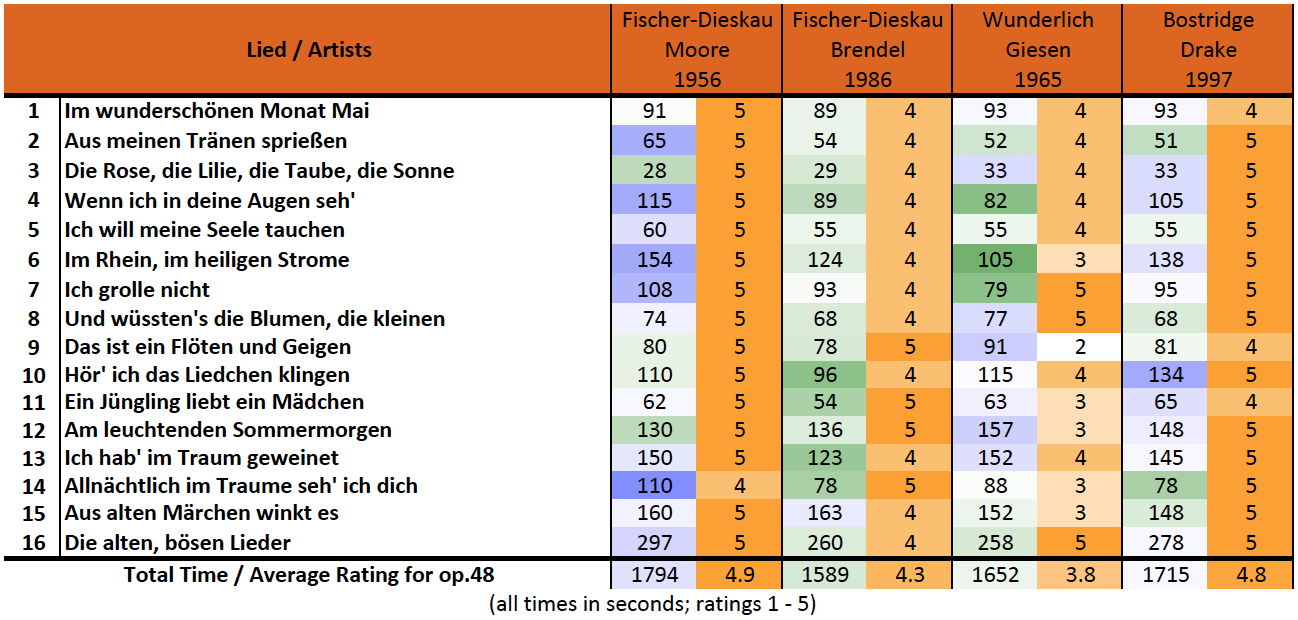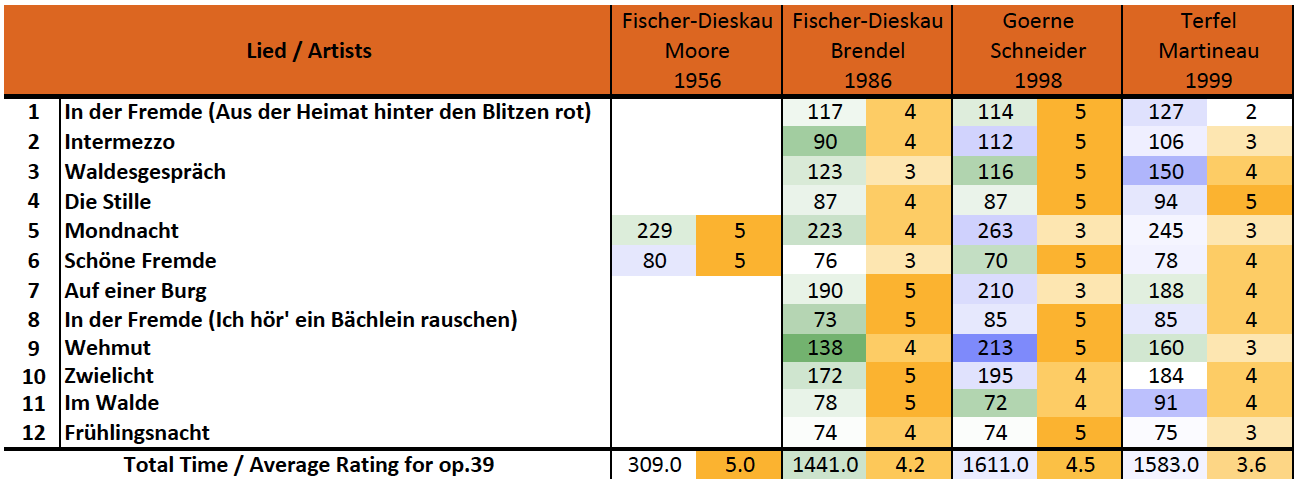Robert Schumann
Liederkreis, op.39; Dichterliebe, op.48
Media Review / Comparison
2013-01-06 — Original posting (on Blogger)
2013-01-13 — Added addendum I and II, see below
2013-08-06 — New standard layout applied
2014-11-08 — Re-posting as is (WordPress)
2016-07-11 — Brushed up for better readability
Table of Contents
Introduction
In my “Listening Diary 2012-11-01” I briefly mentioned the Schumann Lieder cycles “Liederkreis”, op.39, and “Dichterliebe”, op.48, promising a return in more detail, as I was just about to add another recording that I already had on LP. I have now downloaded that recording (Dietrich Fischer-Dieskau and Alfred Brendel with the two song cycles reviewed in this posting), and here are my findings — not overly detailed, though.
The Recordings
With the exception of the new addition, all of these recordings were already mentioned in the “Listening Diary 2012-11-01”:
Fischer-Dieskau / Moore: Schubert & Schumann
Schubert: 6 Lieder from Schwanengesang
Schumann: Dichterliebe op.48
Dietrich Fischer-Dieskau, Gerald Moore (Live, Salzburg, 1956)
Orfeo C 294 921 B (CD, stereo); © / ℗ 1992; EAN-13 4011790294124

Dietrich Fischer-Dieskau, Alfred Brendel: Schumann
Schumann: Liederkreis, op.39; Dichterliebe op.48
Dietrich Fischer-Dieskau, Alfred Brendel
Philips / iTunes download (256 Kbps, stereo); ℗ 1986
(no booklet)

Matthias Goerne, Eric Schneider: Schumann
Schumann: Liederkreis, op.39; 12 Gedichte op.35
Matthias Goerne, Eric Schneider
Decca 460 797-2 (CD, stereo); ℗ / © 1999; barcode 028946079720

Bryn Terfel, Malcolm Martineau: Schumann
Schumann: Liederkreis, op.39; Romanzen, Balladen
Bryn Terfel, Malcolm Martineau
DG 289 447 042-2 (CD, stereo); ℗ 2000; barcode 028944704228

Wunderlich / Giesen: Beethoven, Schubert, Schumann
Beethoven: Lieder WoO 123, 149, opp.46, 128
Schubert: 9 Lieder
Schumann: Dichterliebe op.48
Fritz Wunderlich, Hubert Giesen
DG 449 747-2 (CD, mono); ℗ 1966; barcode 028944974720

Ian Bostridge, Julius Drake: Schumann
Schumann: Liederkreis, op.24; Dichterliebe op.48; 7 Lieder
EMI Classics 56575 (CD, stereo); ℗ / © 1998; barcode 724355657527

Robert Schumann (1810 – 1856): Dichterliebe, op.48
I now have four complete recordings of this song / Lieder cycle (after poems by Heinrich Heine), all of which are excellent and unique is one or the other way. Below you find a complete table with durations for every song (excluding silence and applause, of course), as well as individual and summary ratings for every artist.
Fritz Wunderlich and Hubert Giesen (1965)
Fritz Wunderlich and Hubert Giesen recorded this song cycle in 1965, about one year before Wunderlich’s tragic accident. What I have written in my “Listening Diary 2012-11-01” certainly holds true for this cycle as well: Wunderlich is best in lyrical pieces, less so in dramatic songs (or songs with an ironic or sarcastic tone). One song received a rather poor rating: Nr.9, “Das ist ein Flöten und Geigen” requires extremely fast declamation, causing Wunderlich to slow down, which feels rather odd (would have been better to use a slower tempo altogether). On the other hand, there are the songs in which Wunderlich can play out his unique timbre and brilliance in his voice!
Ian Bostridge and Julius Drake (1997)
Ian Bostridge and Julius Drake recorded the cycle in 1997; to me, there is no doubt that Ian Bostridge is one of the very top lyrical tenors in recent years; his voice control, his timbre, but also his mastering of the German language in these songs are all excellent — and so is his interpretation of these songs — and Julius Drake proves to be an adequate partner for this great singer: definitely a top recommendation among recent recordings!
Dietrich Fischer-Dieskau and Gerald Moore (1956)
Dietrich Fischer-Dieskau and Gerald Moore have performed this song cycle at the Mozarteum Salzburg on August 13th, 1956, during the Salzburg Festival 1956. A live recording was made from this breakthrough performance. In a recent radio discussion honoring FiDi’s career, this recording was not played at all, but it was mentioned as one of best (if not the best) performance of the cycle by this exceptional artist. And I can only confirm: the span, the depth, and the power of Fischer-Dieskau’s voice at that time are hard to match, and hard, if not impossible to beat — truly phenomenal!
Of course, there are limitations in the quality of this early stereo recording. However, these are more than outbalanced by the uniqueness of this voice. Plus: Gerald Moore is the perfect accompanist for Fischer-Dieskau: never playing himself into the foreground — excellent and accurate in solo passages, but taking himself back in the accompanying part. There one single song where I found his later recording with Brendel (see below) and/or Ian Bostridge better: Nr.14 “Allnächtlich im Traume seh’ ich dich”, where the bitter irony (especially in the last verse) isn’t felt to the degree of the other recordings. Still, this recording clearly is a must-have, not only for fans of Fischer-Dieskau!
Dietrich Fischer-Dieskau and Alfred Brendel (1986)
Dietrich Fischer-Dieskau re-recorded this song cycle with Alfred Brendel in 1986, 30 years after the Salzburg recording; overall, this is still a very good performance, though I prefer Ian Bostridge’s recording. The signs of those 30 years are fairly obvious: the span and the power in his voice have diminished to a degree that is clearly audible, high passages require considerably more effort (and sometimes suffer in clarity and power), and Fischer-Dieskau certainly was aware of these changes. To compensate, he tends towards faster tempo (so the phrases become shorter), and weaknesses in his voice are overplayed by increasing focus on declamation (which some might call “declamatory FiDi-mannerism”).
To me, this isn’t / cannot be a full substitute for the qualities of his voice in the early years. The other “flaw” in this recording is with the sound balance. I’m not sure how much of this was controlled by the artists. yes, Brendel is an excellent pianist. I’m thinking of his virtuosic performance in Nr.9 “Das ist ein Flöten und Geigen” and Nr.11 “Ein Jüngling liebt ein Mädchen” which are both better than with all the other accompanists. However, quite often in this recording I get the impression of “piano pieces with the accompaniment of a voice in the background”. If this was intentional, it might have been a (poor) attempt to mask weaknesses in Fischer-Dieskau’s voice? Overall, I clearly prefer the historic recording from 1956 (or Ian Bostridge’s, if you will).
Comparison Table
In the table below, I used color coding to indicate fast/short performances (green) vs. slow/long ones (blue); all times are in seconds, excluding longer silence or applause. The color coding in the ratings is obvious:
Robert Schumann (1810 – 1856): Liederkreis, op.39
I have three full recordings of this song cycle after poems by Joseph von Eichendorff:
Bryn Terfel and Malcolm Martineau (1999)
Bryn Terfel and Malcolm Martineau in a recording from 1999: I find Bryn Terfel most impressive in Nr.4 “Die Stille” (expressive in his sotto voce / whispering!), but otherwise often too dramatic, theatrical. He has a great voice, but I don’t think Schumann’s song cycle is his “proper playground”!
Matthias Goerne and Eric Schneider (1998)
Matthias Goerne and Eric Schneider recorded the cycle in 1998: This is a truly excellent performance which — for me — beats Fischer-Dieskau’s performance from 1986. I think this is one of the top Lieder singers now: a great, very expressive voice with a large dynamic & dramatic span, and a singer who can match Dietrich Fischer-Dieskau in the intellectual understanding, i.e., not just singing nice melodies, but presenting / interpreting the content of the underlying poem (I’ll return to this singer in a different context). Also, Eric Schneider is a matching, excellent accompanist, clear, virtuoso, perfectly in tune with the singer.
Last, but not least, the sound management in this recording is excellent, and the piano sound is marvelous (I’m thinking of the piano endings in Nr.6 and 8, exhibiting the artistry in the pianists playing, as well as a beautiful piano sound, and a perfect piano tuning!). Definitely highly recommended!
Dietrich Fischer-Dieskau and Alfred Brendel (1986)
The recording by Dietrich Fischer-Dieskau and Alfred Brendel from 1986 is on the same CD as the cycle “Dichterliebe”, see above. And my remarks about the latter also apply to this cycle: here, I prefer Goerne over Fischer-Dieskau (with few exceptions, see the table below). None of the above can beat the two songs that were added as encore during the Salzburg Festival 1956 (see above):
Dietrich Fischer-Dieskau and Gerald Moore (1956)
The Salzburg Performance by Dietrich Fischer-Dieskau and Gerald Moore in 1956 was devoted to songs after poems by Heinrich Heine by Robert Schumann and Franz Schubert (the latter with excerpts from the “Schwanengesang”). And so was the first of the encores (Schubert, “Myrthen”, op.35). But then, they added Nr.5 and 6 from the Liederkreis op.39, plus two more songs by Franz Schubert. So, there are only two songs from the Liederkreis in this early recording — but these two are miraculous!
I simply can’t imagine a more impressive performance of the “Mondnacht” than this one. To me, one of the best Lied recordings ever (apart from the fact that this song is one of my all-time favorites anyway!). Also from the point-of-view of accompaniment: it’s marvelous how Gerald Moore plays the introduction, but then lowers the volume a tad, such as to allow Fischer-Dieskau’s voice to evolve. And again: this dynamic span, this span of breath, the perfect forming of the long phrases! Also “Schöne Fremde” is at a similar level — though here, Mattias Goerne (see above) comes close. I wish they had performed the entire cycle!!!
Comparison Table
Also in the second table below, I used color coding to indicate fast/short performances (green) vs. slow/long ones (blue); all times are in seconds, excluding longer silence or applause. The color coding in the ratings is obvious.
Addendum: Dietrich Fischer-Dieskau and his Accompanists
In connection with a discussion relating to my Listening Diary 2012-11-01 (see the addendum there), I was pointed to several YouTube videos with Dietrich Fischer-Dieskau:
Gerald Moore
Franz Schubert’s Lied “An die Musik” (op.88/4, D.547) with Fischer-Dieskau / Gerald Moore, in a recording from the 60’s; my comment: “An die Musik” is one of the most beautiful & touching Lieder ever — and this shows Fischer-Dieskau (DFD) at the height of his abilities — and Gerald Moore as congenial accompanist: simply marvelous!
Wolfgang Sawallisch
The recording with Dietrich Fischer-Dieskau / Wolfgang Sawallisch (no longer available) also includes Schumann’s “Mondnacht” (discussed above), my comments regarding Sawallisch vs. Gerald Moore as accompanists equally (or even more?) applies to this composition.
Svjatoslav Richter
In response to the recording with Sawallisch, I pointed to a video with Fischer-Dieskau and Svjatoslav Richter, performing 8 Lieder by Franz Schubert; my comment: Richter is also much better than Sawallisch as an accompanist, I think — and even though this must have been after the recording with Sawallisch, I find DFD better here — maybe due to the interaction / mutual stimulation between the two great artists?
Alfred Brendel
I was then pointed to Schubert’s “Winterreise” with Fischer-Dieskau and Alfred Brendel (video no longer available); my comment: DFD is excellent — not so sure I like Brendel for this; and DFD at that time had lost already a fair amount of his volume and range — and is (masterfully, of course) compensating with drama / diction / expression. Overall, I suspect that this recording now has serious competition among newer ones.
Maurizio Pollini
Finally, I listened to Fischer-Dieskau performing the “Winterreise” with Maurizio Pollini: I think DFD is definitely past the top in this recording (just mono, unfortunately, and just with two stills, no video), but when comparing this one to DFD / Brendel, I prefer the version with Pollini: the piano part may be the most articulate among all DFD recordings of this cycle (in my memory, at least) — but I think it still does not dominate, and DFD is perfectly in tune with the pianist — I quite like this recording!
Ongoing / Planned Lieder CD Projects
One of the projects for the coming years years will be the 24 CDs with DFD / Moore (all Schubert songs), along with other recordings, as present in my collection: I have the “Winterreise” in 3 versions: DFD / Moore, DFD / Demus (won’t add DFD/Brendel) and Goerne / Brendel, and “Die schöne Müllerin” in 5 versions (Goerne / Schneider, Bostridge / Johnson, Haefliger / Werba, DFD / Moore, and Prégardien / Staier) — altogether over 1.5 days of music … I intend to make this my “side project” for the coming years …















